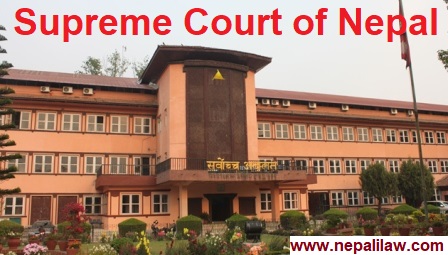September 6, 2018
The Supreme Court underscored the importance of establishing criminal liability in cases of serious medical negligence during patient treatment, on a nine-year-old case regarding medical negligence.
A division bench comprising Justices Dr. Ananda Mohan Bhattarai and Sapana Pradhan Malla recognized that both civil and criminal liability should be pursued if negligence is proven in medical treatment.
This landmark decision from the apex court comes amidst ongoing agitation from doctors nationwide, urging for provisions to investigate complaints against doctors to be incorporated into the new Mulki Civil Code rather than the Criminal Code.
The bench delivered its judgment on a compensation case filed by Ahmad Miya following the death of hospital patient Rajiya Khatun. The plaintiff sought compensation from the medical team led by Dr. Pramod Paudel of Prithvi Chandra Hospital in Ramgram, Nawalparasi.
The team was accused of administering incorrect treatment, resulting in the patient’s demise three days after discharge from the hospital while undergoing further treatment in India.
“If medical negligence is acknowledged as a criminal offense, the resolution would be through restorative justice rather than escalating conflict between the involved parties.”
The patient was suffering from septicemia.
The Supreme Court ruling overturns the decision of the former Butwal Appellate Court Judges Deepak Raj Joshee and Govinda Prasad Upadhayaya, who had annulled the District Compensation Committee’s directive to the defendants to compensate for administering incorrect medical treatment.
The bench ordered the defendants to pay Rs 45,000 in compensation to the victim’s family. Dr. Paudel’s team, which included nurses Shanta Paudel and Anita Jaiswal, had appealed to the appellate court, contesting the compensation committee’s decision. The victim’s family had approached the Supreme Court six years ago.
The apex court’s verdict stated: “It appears to be a case of ordinary negligence on the part of the hospital, and since the patient died three days after discharge and during treatment in India, compensation amounting to Rs 45,000 must be awarded to the victim’s family in accordance with Section 24 of the Consumer Protection Act 1998 and Rule 45 of the Consumer Protection Rules, 1999. However, since the exact cause of death could not be determined, the claim for additional compensation could not be established.”
The Supreme Court delivered the verdict ten months ago but released the full text of the judgment only on Wednesday. “It is imperative for the court to scrutinize complaints from any victim, as it cannot overlook its duty to safeguard people’s rights as per the constitution and laws,” the judgment stated. The bench also stressed the necessity to eradicate medical negligence and conduct investigations to ascertain whether criminal negligence occurred.
The judgment suggested initially examining whether a case falls under civil liability. However, if the level of negligence is severe, it should be treated as criminal liability.
The bench noted that Article 25 of the Constitution guarantees various health-related rights such as the right to medical treatment, basic healthcare, emergency treatment, and the right to information regarding treatment. Similarly, Article 38(2) ensures safe motherhood and reproductive rights.
“These rights must always be upheld,” the bench reiterated.
Furthermore, it stated, “It would be inappropriate to unnecessarily criminalize matters or demoralize medical practitioners. It would not be beneficial to think otherwise when they are striving to perform their duties diligently.”
The bench also outlined four significant actions to be taken by the government to safeguard people’s health rights. These include effectively managing physical and human resources in government-owned hospitals; establishing minimum service standards for government and private hospitals along with proper documentation and procedures; implementing insurance programs for the security of both doctors and patients; and impartially determining liabilities through investigations into possible negligence.
“If medical negligence is deemed a criminal offense, the focus should be on restorative justice rather than exacerbating disputes between parties,” the bench concluded. “Therefore, the government must earnestly address the provision of human and physical resources in medical institutions to mitigate such issues.”
 Nepali Law A complete legal information portal
Nepali Law A complete legal information portal




